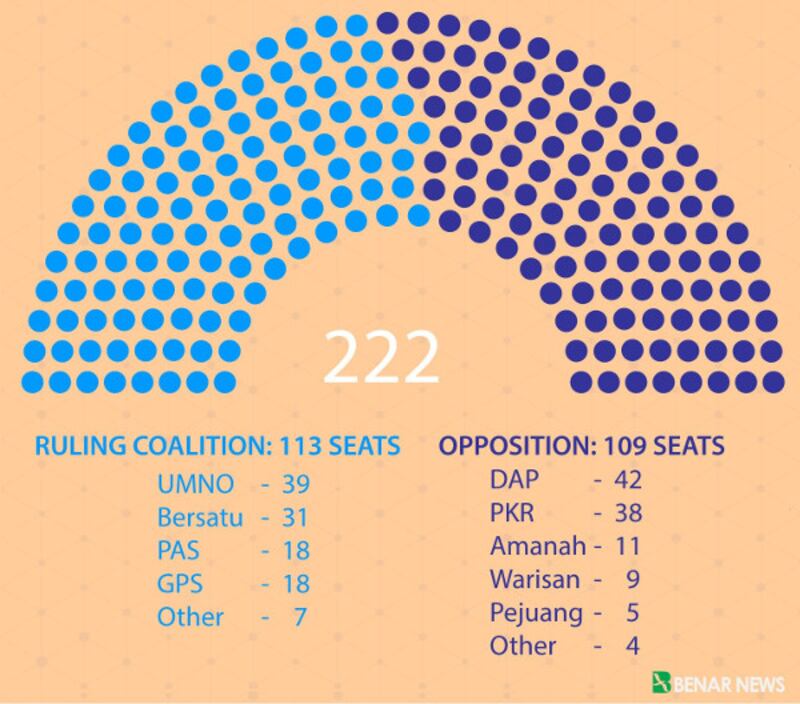Malaysia’s prime minister has formally aligned his party with conservative Muslim party PAS and disgraced former leader Najib Razak’s UMNO in a move that is key to his political survival as his government clings to a razor-thin parliamentary majority, analysts said.
The move is the latest attempt by Prime Minister Muhyiddin Yassin – who once defected from the United Malays National Organization party and joined a successful effort to topple it – to find solid political ground after the head of the Bersatu party became Malaysia’s unelected leader in March.
“Muhyiddin needs to be in Muafakat Nasional,” said Tunku Mohar Mokhtar, a political scientist at International Islamic University of Malaysia, referring to the alliance that Pan-Malaysian Islamic Party (PAS) and UMNO, two longtime heavyweights in Malaysian politics, formed after the latter was ousted in the country’s first-ever change of government in elections held in May 2018.
“He knows that alone, Bersatu cannot gain support from the electorate. It has weak grassroots, and for that, a coalition with bigger and more established parties is the only way to strengthen his own and his party’s positions. For Bersatu, being alone in electoral politics is suicidal,” Mokhtar told BenarNews.
With the prospect of snap polls looming, Muafakat Nasional announced on Wednesday that it had accepted Bersatu as part of its alliance.
“UMNO and PAS formed Muafakat Nasional because we realized that the Malays’ and the Muslims’ political power is weakening because of the severe split … and praise to God, MN has received a new injection to further strengthen it when we were informed by the Bersatu president of the party’s willingness to join MN,” coalition co-secretary general Annuar Musa said in a social media post.
UMNO led the government since Malaysia’s inception in 1957 until the 2018 electoral upset of its Barisan Nasional coalition by one led by former Prime Minister Mahathir Mohamad who, with Muhyiddin, headed Bersatu.
The hardline PAS has for three decades governed in the northern state of Kelantan, where strict Islamic law is observed, meaning nightclubs and cinemas are banned and supermarkets have separate lines for men and women.
“UMNO, PAS and Bersatu are like three lovers who need each other but at the same time want a bigger space in bed. MN is Muslim only while Barisan Nasional and Perikatan Nasional (PN) have non-Muslim members as ornaments,” political analyst Wong Chin Huat told BenarNews.
Bersatu, UMNO and PAS are all Malay-based parties. But last weekend, Muhyiddin indicated that he was mulling the possibility of opening his party’s membership to people who are not members of the Malay majority – the nation’s biggest voting bloc – and changing the party’s charter to transform Bersatu into a multi-ethnic party.
“It will be brought to the supreme council and if it is accepted, we will conduct an extraordinary general meeting to amend the Bersatu constitution,” the prime minister said Saturday after welcoming about 200,000 multiracial members of four NGOs as they hosted a gathering in Kuala Lumpur that day.
Even as his party joins MN, Muhyiddin is expected to formally launch PN, the coalition he formed in March to gain support from a majority of the 222-member Parliament to lead the government, according to the Straits Times newspaper. UMNO and PAS were among the biggest parties in the loosely grouped but informal Perikatan alliance, when Muhyiddin came to power in early March.
Bersatu is represented by 31 MPs, while UMNO has 39 and PAS has 18. Another 18 MPs who are members of the coalition of parties from the Malaysian Borneo state of Sarawak and seven others give Muhyiddin the support of 113 MPs.

Since Muhyiddin took power in March, Bersatu has lost nine MPs, including Mahathir, but regained 11 seats when Mohamed Azmin Ali left the People’s Justice Party (PKR) and brought along his loyalists to join Bersatu. Azmin, who had been the PKR deputy president, serves in the cabinet as International Trade and Industry minister.
Pejuang party
Mahathir, who is 95, is not ready to retire from politics. He served as prime minister and the leader of UMNO from 1981 to 2003. After the 2018 polls, he served as prime minister of the Pakatan Harapan ruling bloc and head of the upstart Bersatu until he stepped down in February, when his government collapsed over political infighting.
On Aug. 7, he, along with five others including his son, Mukhriz, announced the launch of a new political party. Calling themselves Parti Pejuang Tanah Air (Homeland Fighters Party), or simply Pejuang, the new party has been gaining support from Bersatu grassroots members who had left the party, according to analysts.
Mahathir is not the only former leader who is working to maintain his political standing.
Najib, the disgraced former prime minister who lost power but maintains his seat in parliament, has since been convicted of corruption charges linked to the 1Malaysia Development Berhad scandal, in which billions of dollars were looted from the state investment fund that he started during his time in office.
Sentenced to 12 years and fined U.S. $49 million in late July, Najib campaigned for UMNO candidates in a local by-election about 90 minutes north of Kuala Lumpur last weekend while freed pending an appeal of his conviction, according to Reuters news service.
Two days after Najib was convicted, Ahmad Zahid Hamidi, his former deputy who leads UMNO, announced that the party was distancing itself from Muhyiddin’s Perikatan coalition, and would not formally join it.
“UMNO has decided not to join PN. Instead we will strengthen Muafakat Nasional,” Zahid announced on July 30.
Mokhtar, meanwhile, said Muhyiddin should be concerned about one of Bersatu’s partners.
“If UMNO can decide on someone from among its leadership (probably not Zahid who’s facing a court case), then it’s unlikely Muhyiddin will remain PM,” Mokhtar said.
Zahid himself has been charged with 45 criminal offenses, including abuse of power, criminal breach of power and money laundering linked to alleged bribes.
